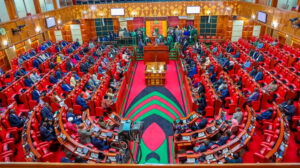Education CS Hon Ezekiel Machogu, issued a stern warning to secondary school principals regarding school fee increases in response to a recent capitation cut by the government.
According to a report by the Nation, Machogu emphasized that despite the government’s decision to reduce capitation from Shs 22,000 to Shs 17,000 per student, schools must not pass this financial burden onto parents through fee hikes.
He underscored that any school head found increasing fees would face serious consequences for disregarding the directive.
The reduction in capitation, which marks a notable decrease per student per year, is aimed at restructuring education funding.
However, it has raised concerns, especially among day schools that heavily rely on capitation to meet operational costs.
For many institutions, this cut could potentially strain their financial resources and operational capabilities.
“Education CS Machogu warns secondary school principals not to increase fees even after State cut capitation to Sh17,000 from Sh22,244 per learner per year,” the report highlighted.
This directive represents the government’s firm stance on maintaining affordable education access amidst fiscal adjustments.
The decision to slash capitation is unprecedented in scale, marking a significant policy shift that could impact the financial stability of educational institutions across Kenya.
Day schools, in particular, face the brunt of this adjustment, as they traditionally rely on capitation funds to cover essential expenses such as teacher salaries, infrastructure maintenance, and learning materials.
Critics argue that while reducing capitation aims to streamline government spending, it risks compromising the quality of education and accessibility for students, especially those from economically disadvantaged backgrounds.
They urge the government to consider alternative strategies to mitigate the financial strain on schools without jeopardizing educational standards.
Proponents of the capitation cut contend that it is a necessary step towards fiscal discipline and resource allocation efficiency within the education sector.
They assert that maintaining financial sustainability is crucial for long-term educational development and improvement.
Stakeholders in Kenya’s education sector will closely monitor its effects on school operations, student enrollment, and academic outcomes.
The government’s commitment to monitoring fee adjustments and enforcing compliance among school administrators underscores the ongoing efforts to uphold affordability and equity in education.
CS Machogu’s warning signals a pivotal moment for Kenya’s education landscape, as schools navigate the challenges posed by reduced capitation.
The outcome of this policy decision will shape the future of education financing and accessibility in the country, prompting continued dialogue and strategic planning to support educational institutions and students alike.





















Add Comment